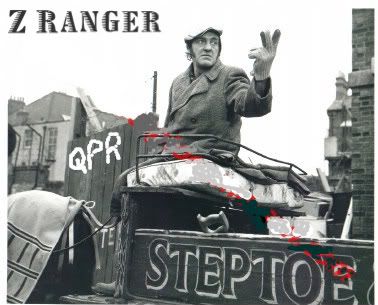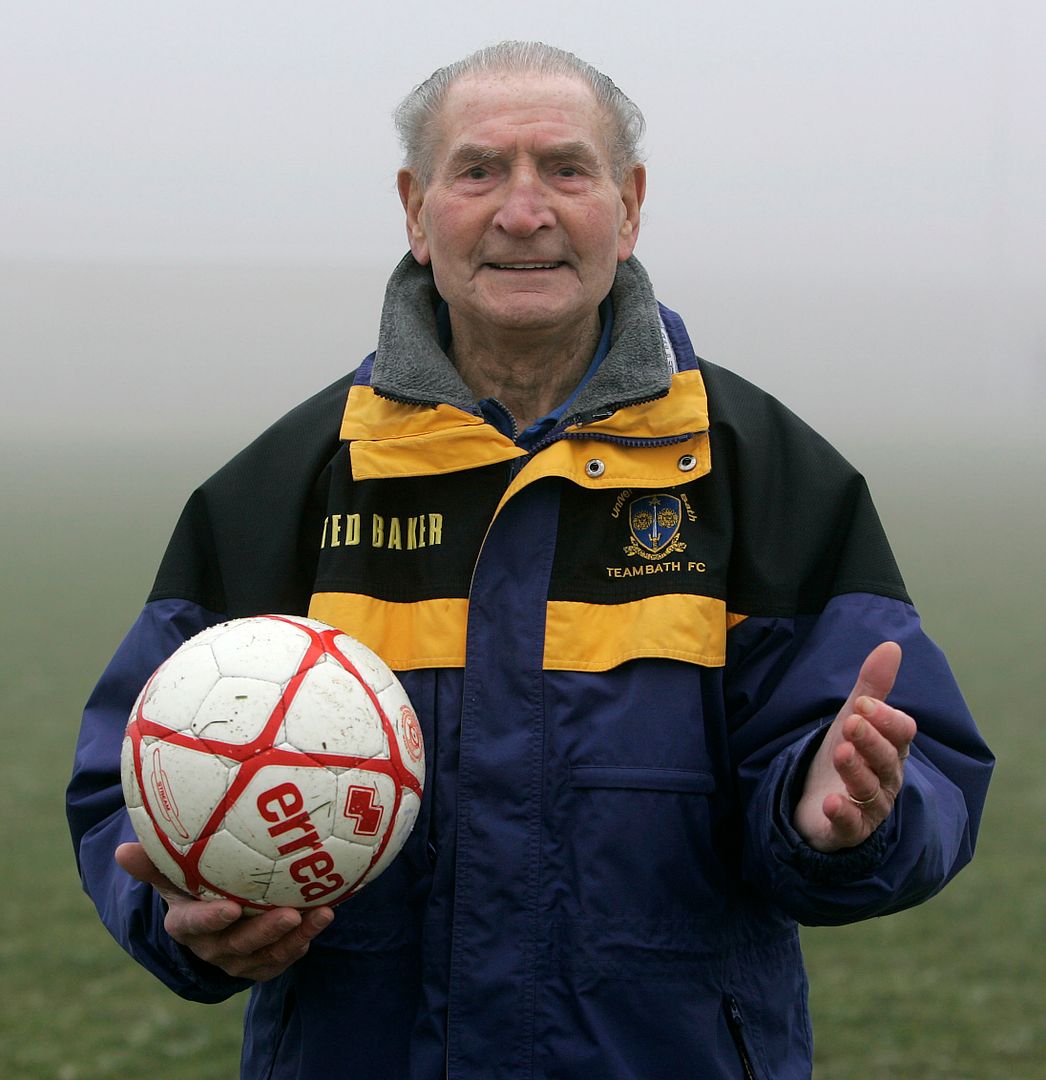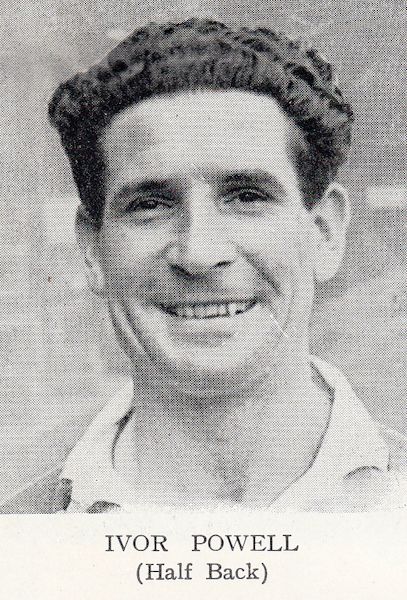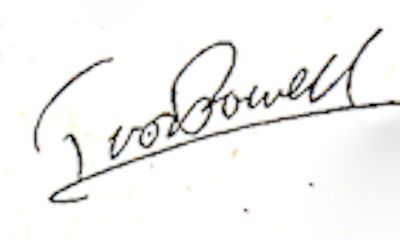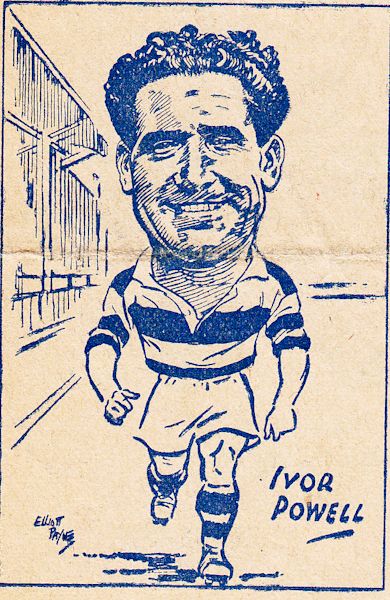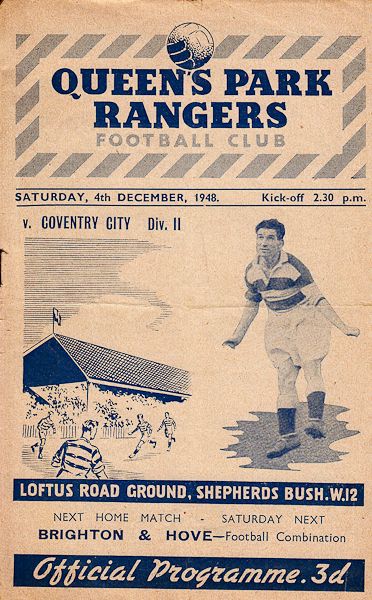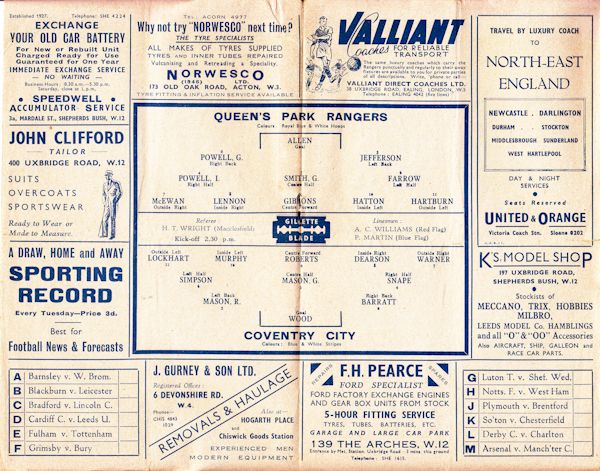Post by Macmoish on Jul 5, 2012 5:39:38 GMT
Posted on QPR Report in 2007
Saturday, December 29, 2007
Former QPR Star, Ivor Powell Awarded MBE
-
Ivor Powell, who played for QPR between 1938 and 1948 (with a big gap in the middle!) has been awarded the MBE.
The Guardian
"Also honoured in the New Year's list is Ivor Powell, the world's oldest active football coach, who will receive an MBE for services to sport. Now 91, Powell is a former Wales international who numbered Aston Villa, QPR and Blackpool among his clubs. The nonagenarian has worked as a football coach at the University of Bath for over 30 years and still lends a hand with coaching duties for Team Bath, the British Gas Business Football League Premier Division side.
"This is a real honour and a privilege," said Powell. "It was a big surprise when I got the letter. I've been in football for more than 70 years and I've thoroughly enjoyed every moment of it. I'm 91 and I've still got something left in me to give. I'll stay in the game as long as I'm enjoying it." The Guardian
See August 2007 Profile of Ivor Powell
Sunday Independent - Ivor Powell: He's 91 but Ivor still loves running the Bath
'The Professor' is football's oldest coach and will be in the dug-out when his university team kick off the new season. By Alan Hubbard
Ivor Powell has passed a fitness test and will be on the bench when his club, Team Bath, play a home friendly with a Cardiff City XI tomorrow night. He is still suffering a bit of a foot problem – nothing as glamorous as a Beckham-style metatarsal, just an old-fashioned bunion on his toe. Mind you, he is 91.
Dear old Ivor, you see, is a team coach, the oldest working model in the land – and something of an icon down at the University of Bath, where he is in his 35th year on the football coaching staff, and raring to go for thenew season.
The bunion is why he joined Thursday's training session in carpet slippers, joshing with the university lads, who call him "The Professor". Powell will be on the bus, and in the dug-out as usual, when Team Bath kick off in the British Gas Business Football League Premier Division at Banbury next Saturday. A far cry from the heady days when he won 14 caps as a terrier of a half-back for Wales, captained Aston Villa and coached under Don Revie at Leeds and with the Greek side PAOK.
But the little Welshman says he has never been happier, which is why he was relieved to get the all-clear when he went to hospital for a check-up last week. He came through with flying colours, and says: "I told them, 'I've done a hell of a lot in my life, and in football, but there's still a lot more I want to do.' I'll never give up my work. Never."
A Fergie-like fervour courses through his veins in tandem with his Celtic blood. The passion is evident as the eyes flash and the words tumble forth when herecalls not only memorable moments from the "good old days" but his commitment to the modern game.
He thumps a fist into his palm. "Aggression, determination, the will to win. These have always been my watchwords, and they still are. That's what I try toinstill into these youngsters. And they listen, they really do."
"The lads love him," says Team Bath's head coach, Andy Tilson, ex-Grimsby and QPR, who, at 42, is less than half the age of his venerable assistant. "He's one of the game's great characters, brimful of fire and enthusiasm. He's indispensable. Players like continuity, a familiar face, and they have so much respect for him. In Ivor you have the most experienced football brain in the land. The little snippets he passes on to them and to me and the other coaches are invaluable, because he's been there, done it, and got the international shirt, even if it was in a different era.
"The thing is, he's so open-minded, and even though the game has changed so muchhe's learned how to adapt andimpart the knowledge he has. He's so keen we have to hold him back a bit, because we don't want him overdoing things."
Clearly Powell is not just a talisman, or another old-timer with a few rheumy-eyed reminiscences of those good old days. Team Bath's manager, Ged Roddy, who is also the university's sports director, says: "The word 'legend' is overworked but Ivor is exactly that, an institution. I don't know what we'd do without him. When he walks in, he lights the place up."
He is recognised by the Guinness Book of Records as the oldest working coach in football, and has also had an FAcoaching badge for 56 years. "There's no record of anyone having coached for a longer period atthis level," confirms the FA historian David Barber.
Powell was a member of the backroom team when Team Bath became the first university side in 122 years to reach the first round proper of the FA Cup five years ago, losing 4-2 at home to Mansfield. Last season they were BGB League runners-up, losing a play-off final for promotion to Blue Square South (a division down from the old Conference). Helping them to achieve promotion this season is Powell's goal.
"These boys play the game the way I like to see it played, hard but fair. When I'm in the dug-out I see little things, and they appreciate me telling them quietly. So does Andy. My way is not to shout or put my foot down, but to coax and encourage. I never curse. You can do it without effing and blinding. They understand what I am talking about, and when I demonstrate, whether it is passing or heading, they know I've done it – and I can still do it."
Spry and alert, he was still turning out for practice games when he was in his 80s. A diminutive midfielder built on the lines of Alan Ball, he was"aggressive but never dirty" in the days of half-backs andinside- forwards, when full-backs would have got a rollicking had they dared overlap. Strikers, sweepers and wingless wonders were still a twinkle in the eye of revolutionaries such as Ron Greenwood and Sir Alf Ramsey.
But Powell, when he became a coach, had to latch on to "total football". "I couldn't have players saying I knew nothing about the way the game is played today. Then we never knew anything about 4-2-2 or 4-4-3. Tactics were more adventurous, with more possession, more accurate passing, better use of the long ball.
"There wasn't all this man-to-man marking. You had spaces where you could receive the ball and run with it. We played for ourselves, but we also played for the team, and the spectators, too. What I really wish is that today's fans could see and enjoy the game as we used to play it. It would be an eye-opener."
A grammar schoolboy who was the seventh son of a seventh son in a family of 10, Powell started working life down the mines for 12 shillings and sixpence a week with his father and brothers, but after three years was spotted by a QPR scout when playing for South Wales League side Bargoed Thursday, aged 17. "I said to myself, 'I'm never going down that bloody mine again'. I never did."
He made his first-team debut for QPR in 1937, won a Division Three (South) championship medal with them, was transferred to Aston Villa for a then record fee for a half-back of £17,500 and played for, coached or managed Port Vale, Bradford City, Leeds, Carlisle, PAOK and Bath City before joining the University of Bath coaching set-up in 1972.
In his managerial heyday, Powell was responsible for some of football's legendary malaprop-isms. Asked the secret of his team's success at Carlisle, where he was a successor to Bill Shankly, he put it down to "the harmonium in the dressing room". He was also reputed to have once remarked that the dressing room was so hot "the compensation was running down the walls".
Powell is probably the only man around who played both with and against the late Sir Stanley Matthews, guesting for Blackpool during the war years, when he was an RAF physical training instructor. Matthews was best man at his wedding, and Ivor's eyes still fill with tears when he speaks both of his pal's death and that of his own wife of 63 years, Joan, who passed away four years ago. "But for football," he says, "I don't think I could have carried on."
As left-half for Aston Villa and Wales, Powell often had the dreaded task of marking the doyen of the dribble. "They say Stan couldn't have been theplayer he was in the modern game, but don't you believe it. What everyone forgets is his speed. We used to train with the great West Indian sprinterMcDonald Bailey, and Stan was as fast as him over 10 yards. No one was better at anticipating a tackle. He could see it coming and he'd be up and over them. I'd back him against any of today's defenders. He'd have skinned them alive."
Powell also marked other tricky forwards, including Don Revie, who made him trainer/ coach at Leeds, where he worked for four years with the likes of Billy Bremner, Norman Hunter and Jackie Charlton.
Among his proudest moments was being inducted into the Welsh Sports Hall of Fame in 2004, along with other Wales sporting greats including Gareth Edwards, Dame Tanni Grey-Thompson, Ian Rush, JPR Williams and John Charles.
"When I see today's antics on the field, the jersey-pulling, the kicking and all that, I'm really proud I was never sent off, or even cautioned. Yes, I tackled hard, but I made sure I was never late. There's a hardness, a ruthlessness about the game now that didn't exist then, and of course it's all down to money.
"Our wage was £8, with a £2 win bonus and £1 for a draw. And £6 in the summer. When I was transferred I got £750. But the cheque I received was for £412 and 10 shillings. They took £337 and 10 shillings for income tax. We never had agents or account-ants to take care of that sort of thing. My transfer fee was £17,500. Some Premiership players get more than that in a week. If I was getting the money these buggers are getting now they would never get the ball off me."
No big money at Bath, though, whose team is comprisedlargely of youngsters released by League clubs or their academies. Here they are given a fresh start in football alongside a foundation degree course in sports performance at the country's most prolific and progressive sports university.
A year ago last July, they gave Powell a 90th birthday party, and many of the Professor's graduates came back to help him celebrate. Nick Bath was a biology student there from 1972 to 1976. He recalled: "Ivor was passionate about the game then and he still has that same fire in his eyes. He believed in keeping it simple, and being coached by someone of his calibre made us feel good. We were pretty hopeless by comparison, but he never gave up on us."
The Powell philosophy is equally simple: "You've got to have a winning heart. That's everything. And as long as I get pleasure out of doing what I am now, and help others to get pleasure out of it, then I know I am doing justice to myself and my career. I could never give this up. As long as they want me, I'll be here."
Life and times
BORN: 5 July 1916, Gilfach Bargeod, South Wales.
Playing career: Signed by QPR at 17. Transferred to Aston Villa in 1948 for then record fee for a half-back of £17,500. Capped 14 times for Wales in 1930s, '40s and '50s.
Coach/Manager: Port Vale, Bradford City, Leeds, Carlisle, PAOK (Athens), Bath City. Now assistant coach and presidentat Team Bath.
Family: Seventh son of seventh son. Wife Joan died in 2003.
Other achievements: 'Guinness Book of Records' as oldest working football coach. Elected to Welsh Hall of Fame in 2004.
And another thing: Middle name given by his father, who fought in the First World War.
Further reading about Ivor Powell's achievements at teambath.com/?p=288 Sunday Independent QPR Report
See Wikipedia Profile of Ivor Powell
en.wikipedia.org/wiki/Ivor_Powell
qprreport.blogspot.com/2007/12/former-qpr-star-ivor-powell-awarded-mbe.html
Saturday, December 29, 2007
Former QPR Star, Ivor Powell Awarded MBE
-
Ivor Powell, who played for QPR between 1938 and 1948 (with a big gap in the middle!) has been awarded the MBE.
The Guardian
"Also honoured in the New Year's list is Ivor Powell, the world's oldest active football coach, who will receive an MBE for services to sport. Now 91, Powell is a former Wales international who numbered Aston Villa, QPR and Blackpool among his clubs. The nonagenarian has worked as a football coach at the University of Bath for over 30 years and still lends a hand with coaching duties for Team Bath, the British Gas Business Football League Premier Division side.
"This is a real honour and a privilege," said Powell. "It was a big surprise when I got the letter. I've been in football for more than 70 years and I've thoroughly enjoyed every moment of it. I'm 91 and I've still got something left in me to give. I'll stay in the game as long as I'm enjoying it." The Guardian
See August 2007 Profile of Ivor Powell
Sunday Independent - Ivor Powell: He's 91 but Ivor still loves running the Bath
'The Professor' is football's oldest coach and will be in the dug-out when his university team kick off the new season. By Alan Hubbard
Ivor Powell has passed a fitness test and will be on the bench when his club, Team Bath, play a home friendly with a Cardiff City XI tomorrow night. He is still suffering a bit of a foot problem – nothing as glamorous as a Beckham-style metatarsal, just an old-fashioned bunion on his toe. Mind you, he is 91.
Dear old Ivor, you see, is a team coach, the oldest working model in the land – and something of an icon down at the University of Bath, where he is in his 35th year on the football coaching staff, and raring to go for thenew season.
The bunion is why he joined Thursday's training session in carpet slippers, joshing with the university lads, who call him "The Professor". Powell will be on the bus, and in the dug-out as usual, when Team Bath kick off in the British Gas Business Football League Premier Division at Banbury next Saturday. A far cry from the heady days when he won 14 caps as a terrier of a half-back for Wales, captained Aston Villa and coached under Don Revie at Leeds and with the Greek side PAOK.
But the little Welshman says he has never been happier, which is why he was relieved to get the all-clear when he went to hospital for a check-up last week. He came through with flying colours, and says: "I told them, 'I've done a hell of a lot in my life, and in football, but there's still a lot more I want to do.' I'll never give up my work. Never."
A Fergie-like fervour courses through his veins in tandem with his Celtic blood. The passion is evident as the eyes flash and the words tumble forth when herecalls not only memorable moments from the "good old days" but his commitment to the modern game.
He thumps a fist into his palm. "Aggression, determination, the will to win. These have always been my watchwords, and they still are. That's what I try toinstill into these youngsters. And they listen, they really do."
"The lads love him," says Team Bath's head coach, Andy Tilson, ex-Grimsby and QPR, who, at 42, is less than half the age of his venerable assistant. "He's one of the game's great characters, brimful of fire and enthusiasm. He's indispensable. Players like continuity, a familiar face, and they have so much respect for him. In Ivor you have the most experienced football brain in the land. The little snippets he passes on to them and to me and the other coaches are invaluable, because he's been there, done it, and got the international shirt, even if it was in a different era.
"The thing is, he's so open-minded, and even though the game has changed so muchhe's learned how to adapt andimpart the knowledge he has. He's so keen we have to hold him back a bit, because we don't want him overdoing things."
Clearly Powell is not just a talisman, or another old-timer with a few rheumy-eyed reminiscences of those good old days. Team Bath's manager, Ged Roddy, who is also the university's sports director, says: "The word 'legend' is overworked but Ivor is exactly that, an institution. I don't know what we'd do without him. When he walks in, he lights the place up."
He is recognised by the Guinness Book of Records as the oldest working coach in football, and has also had an FAcoaching badge for 56 years. "There's no record of anyone having coached for a longer period atthis level," confirms the FA historian David Barber.
Powell was a member of the backroom team when Team Bath became the first university side in 122 years to reach the first round proper of the FA Cup five years ago, losing 4-2 at home to Mansfield. Last season they were BGB League runners-up, losing a play-off final for promotion to Blue Square South (a division down from the old Conference). Helping them to achieve promotion this season is Powell's goal.
"These boys play the game the way I like to see it played, hard but fair. When I'm in the dug-out I see little things, and they appreciate me telling them quietly. So does Andy. My way is not to shout or put my foot down, but to coax and encourage. I never curse. You can do it without effing and blinding. They understand what I am talking about, and when I demonstrate, whether it is passing or heading, they know I've done it – and I can still do it."
Spry and alert, he was still turning out for practice games when he was in his 80s. A diminutive midfielder built on the lines of Alan Ball, he was"aggressive but never dirty" in the days of half-backs andinside- forwards, when full-backs would have got a rollicking had they dared overlap. Strikers, sweepers and wingless wonders were still a twinkle in the eye of revolutionaries such as Ron Greenwood and Sir Alf Ramsey.
But Powell, when he became a coach, had to latch on to "total football". "I couldn't have players saying I knew nothing about the way the game is played today. Then we never knew anything about 4-2-2 or 4-4-3. Tactics were more adventurous, with more possession, more accurate passing, better use of the long ball.
"There wasn't all this man-to-man marking. You had spaces where you could receive the ball and run with it. We played for ourselves, but we also played for the team, and the spectators, too. What I really wish is that today's fans could see and enjoy the game as we used to play it. It would be an eye-opener."
A grammar schoolboy who was the seventh son of a seventh son in a family of 10, Powell started working life down the mines for 12 shillings and sixpence a week with his father and brothers, but after three years was spotted by a QPR scout when playing for South Wales League side Bargoed Thursday, aged 17. "I said to myself, 'I'm never going down that bloody mine again'. I never did."
He made his first-team debut for QPR in 1937, won a Division Three (South) championship medal with them, was transferred to Aston Villa for a then record fee for a half-back of £17,500 and played for, coached or managed Port Vale, Bradford City, Leeds, Carlisle, PAOK and Bath City before joining the University of Bath coaching set-up in 1972.
In his managerial heyday, Powell was responsible for some of football's legendary malaprop-isms. Asked the secret of his team's success at Carlisle, where he was a successor to Bill Shankly, he put it down to "the harmonium in the dressing room". He was also reputed to have once remarked that the dressing room was so hot "the compensation was running down the walls".
Powell is probably the only man around who played both with and against the late Sir Stanley Matthews, guesting for Blackpool during the war years, when he was an RAF physical training instructor. Matthews was best man at his wedding, and Ivor's eyes still fill with tears when he speaks both of his pal's death and that of his own wife of 63 years, Joan, who passed away four years ago. "But for football," he says, "I don't think I could have carried on."
As left-half for Aston Villa and Wales, Powell often had the dreaded task of marking the doyen of the dribble. "They say Stan couldn't have been theplayer he was in the modern game, but don't you believe it. What everyone forgets is his speed. We used to train with the great West Indian sprinterMcDonald Bailey, and Stan was as fast as him over 10 yards. No one was better at anticipating a tackle. He could see it coming and he'd be up and over them. I'd back him against any of today's defenders. He'd have skinned them alive."
Powell also marked other tricky forwards, including Don Revie, who made him trainer/ coach at Leeds, where he worked for four years with the likes of Billy Bremner, Norman Hunter and Jackie Charlton.
Among his proudest moments was being inducted into the Welsh Sports Hall of Fame in 2004, along with other Wales sporting greats including Gareth Edwards, Dame Tanni Grey-Thompson, Ian Rush, JPR Williams and John Charles.
"When I see today's antics on the field, the jersey-pulling, the kicking and all that, I'm really proud I was never sent off, or even cautioned. Yes, I tackled hard, but I made sure I was never late. There's a hardness, a ruthlessness about the game now that didn't exist then, and of course it's all down to money.
"Our wage was £8, with a £2 win bonus and £1 for a draw. And £6 in the summer. When I was transferred I got £750. But the cheque I received was for £412 and 10 shillings. They took £337 and 10 shillings for income tax. We never had agents or account-ants to take care of that sort of thing. My transfer fee was £17,500. Some Premiership players get more than that in a week. If I was getting the money these buggers are getting now they would never get the ball off me."
No big money at Bath, though, whose team is comprisedlargely of youngsters released by League clubs or their academies. Here they are given a fresh start in football alongside a foundation degree course in sports performance at the country's most prolific and progressive sports university.
A year ago last July, they gave Powell a 90th birthday party, and many of the Professor's graduates came back to help him celebrate. Nick Bath was a biology student there from 1972 to 1976. He recalled: "Ivor was passionate about the game then and he still has that same fire in his eyes. He believed in keeping it simple, and being coached by someone of his calibre made us feel good. We were pretty hopeless by comparison, but he never gave up on us."
The Powell philosophy is equally simple: "You've got to have a winning heart. That's everything. And as long as I get pleasure out of doing what I am now, and help others to get pleasure out of it, then I know I am doing justice to myself and my career. I could never give this up. As long as they want me, I'll be here."
Life and times
BORN: 5 July 1916, Gilfach Bargeod, South Wales.
Playing career: Signed by QPR at 17. Transferred to Aston Villa in 1948 for then record fee for a half-back of £17,500. Capped 14 times for Wales in 1930s, '40s and '50s.
Coach/Manager: Port Vale, Bradford City, Leeds, Carlisle, PAOK (Athens), Bath City. Now assistant coach and presidentat Team Bath.
Family: Seventh son of seventh son. Wife Joan died in 2003.
Other achievements: 'Guinness Book of Records' as oldest working football coach. Elected to Welsh Hall of Fame in 2004.
And another thing: Middle name given by his father, who fought in the First World War.
Further reading about Ivor Powell's achievements at teambath.com/?p=288 Sunday Independent QPR Report
See Wikipedia Profile of Ivor Powell
en.wikipedia.org/wiki/Ivor_Powell
qprreport.blogspot.com/2007/12/former-qpr-star-ivor-powell-awarded-mbe.html




 Real Football
Real Football 





